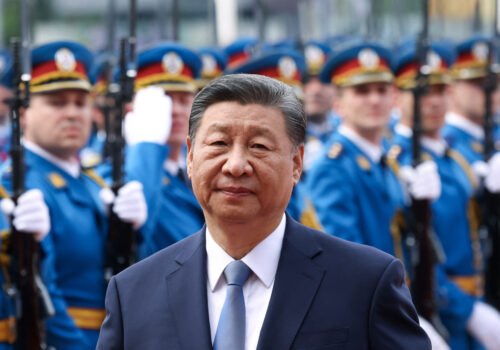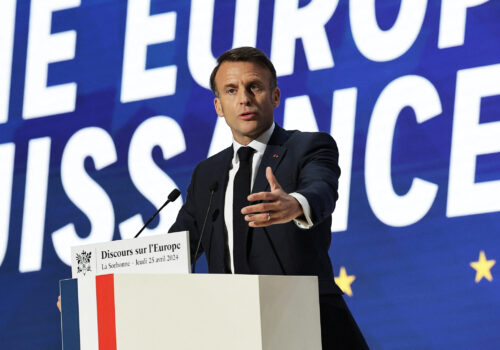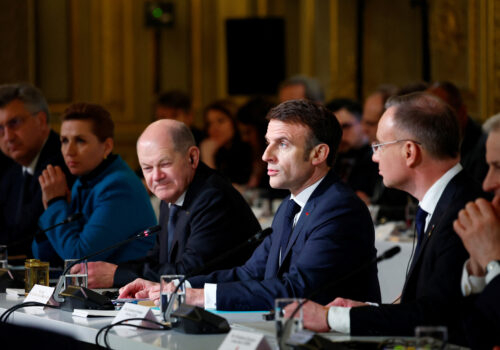After honoring D-Day, Macron and Biden embark on a diplomatic sprint for Europe’s security
US President Joe Biden’s first state visit to France this week marks both the eightieth anniversary of D-Day and the beginning of a critical few weeks for European security. The commemoration in Normandy will be followed by the Group of Seven (G7) summit in Italy June 11-13, the Switzerland peace summit for Ukraine June 15-16, and the NATO Summit in Washington July 9-11. French President Emmanuel Macron hopes that what happens this week in France sets the tone for each of these subsequent events—and he will start by trying to secure more backing from Biden for a stronger and more independent European defense.
Both countries continue to have divergences on two major questions driving the institutional framework for European security: the way to factor the European Union (EU) in transatlantic relations and the nature of the NATO-Ukraine relationship. France has pushed for its vision of “strategic autonomy” and Ukrainian membership in NATO, while Biden has made clear that he was “not prepared to support the NATOization of Ukraine.”
Macron and Biden will be joined for the D-Day commemorations by German Chancellor Olaf Scholz and Ukrainian President Volodymyr Zelenskyy, among others leaders, but notably no Russian representatives. This eightieth anniversary has taken on an even deeper historical weight as it will likely be among the last with living veterans in attendance. The US contribution to the liberation of France and Europe in World War II changed the fate of the continent, and leaders will likely draw lessons from that conflict that can be applied to the continent today regarding Ukraine.
Macron has sought to build momentum for his foreign and European policy in recent months, positioning France to take on greater initiative in supporting Ukraine. At the February 2024 conference on Ukraine in Paris, Macron aimed to build consensus to take new actions on Ukraine but has drawn a lot of criticism for placing the focus on France’s agenda. These actions include cyber-defense, co-production of armaments, enhancing Ukraine’s military capabilities, deepening France’s partnership with Moldova, and sending nonmilitary forces and demining support to Ukraine’s border with Belarus. In late April, he outlined a doctrine in a speech at the Sorbonne on how he would like to shape European security over the next five-year political cycle of the EU. Therefore, for Macron the state visit will also be an opportunity to rally Biden’s support for a strong European defense and closer EU-NATO institutional cooperation. “A sine qua non condition for our security,” Macron said, “is that Russia does not win the war of aggression it is waging on Ukraine. This is essential.”
In his speech, Macron also called for a more “sovereign” Europe, one that is prepared to weather the outcomes if the United States reduces its engagement on the continent. This call is in part a reaction to the Trump administration’s earlier criticism of NATO. There is, however, an unfortunate tendency in the United States and Germany, when French leaders and officials speak of greater European sovereignty, to interpret such statements as France seeking to reinforce its own influence at the expense of transatlantic relations. Such a view should address the real points of divergence and dispel any drawn-out tendency for Franco-American sparring on this point. Biden and Macron both have an opportunity to capitalize on recent momentum to coalesce Europe around longer-term goals for Euro-Atlantic security and a strategy toward Russia. But also, at the bilateral level between France and the United States, extending cooperation in interoperability and other critical domains in defense and security would send a strong signal of unity and resolve to Russia.
French posture toward Russia has hardened considerably since Russia’s full-scale invasion of Ukraine in February 2022, and Macron has sought to underscore this shift and dispel any lingering skepticism among European allies farther east. May 2023 was a turning point, when Macron said in Bratislava that Western Europe “missed opportunities to listen” to the warnings of Central and Eastern European countries about Russia. In doing so, Macron has sought to lay a foundation for France to act as a bridge between the United States and NATO’s eastern flank countries.
In continuation of the February 2024 conference on Ukraine in Paris, Macron has in recent weeks been at the forefront of two initiatives intended to increase the West’s “strategic ambiguity.” This means that as the battlefield constantly evolves, allies must show their adaptability, take the initiative, and create new strategic dilemmas for Russia, rather than draw red lines for themselves. Both initiatives will likely continue to be discussed among Ukraine’s partners in the weeks ahead.
First, Macron has pushed for Ukraine to be allowed to strike targets within Russia with Western weapons. This initiative includes the decision on May 28, during Macron’s visit to Berlin, to allow Ukraine to use weapons delivered by France to strike targets within Russia, including long-range missiles. A direct line can be drawn from the current decision to the proposal stemming from the February 2024 conference on Ukraine to establish a ninth “deep precision strike” coalition within the Ramstein Group (the fifty-six-nation group of supporters of Ukraine’s defense) for supplies of mid- and long-range missiles. The aim of the ninth working group was to mobilize states willing to send such equipment but to also work on operational concepts given how rare and expensive these weapons are. This approval is linked to the current necessity for the defense of Kharkiv and shows that allies are able to adapt quickly to the evolution in the front lines and play on “strategic ambiguity” rather than establish red lines for themselves. The aim is to allow Ukraine to attack the point from which the missiles are fired: to hit the archer instead of the arrow. It is not a blank check, however, and Ukrainian forces are not permitted to hit targets other than those from which the missiles hitting Kharkiv are fired.
Second, Macron has advanced the idea of sending Western military personnel into Ukraine to build up the operational capacity of the Ukrainian armed forces, which has been welcomed by Estonia, the Netherlands, and Lithuania, among others, but remains a very sensitive, divisive issue. France would certainly look to convince the United States and build a coalition of the willing on this initiative. These military personnel would be in supporting roles, such as logistics, maintenance, and training. They could also help in a number of noncombat roles, such as enhancing Ukraine’s resilience against electronic warfare. In return, Western countries would gain a better understanding of terrain and intelligence about Russian forces.
Biden has recently supported the first of these initiatives but not yet the second. Both leaders will have the opportunity to discuss these issues and more options to support Ukraine this week in France and in the weeks ahead. As Russian forces evolve their tactics, NATO’s ability to adapt to Russia’s war of aggression in Ukraine but also respond to Russia’s ability to use latent capabilities all over the eastern flank is paramount in the deterrence and defense of the Alliance.
Finally, it is important to note that Macron’s foreign policy ambitions for Europe, however critical to the continent’s defense, will need to have the support of French voters. Following the D-Day commemoration, Biden and Macron will meet on June 8. The next day, European Parliament elections will be held in France. While Macron has more than two years left in his presidency, the EU parliamentary elections will likely be interpreted by many France watchers as a referendum on the current national government and its policies, both domestic and foreign. With Macron’s party challenged by Marine Le Pen’s populist far-right National Rally, which is currently polling ahead, a setback at the ballot box this weekend could be a setback for the Élysée’s diplomatic efforts, too.
Léonie Allard is a visiting fellow at the Atlantic Council’s Europe Center, previously serving at the French Ministry of Armed Forces.
Further reading
Sat, Jun 1, 2024
Xi Jinping visited Europe to divide it. What happens next could determine if he succeeds.
New Atlanticist By Zoltán Fehér
The Chinese leader's mission during his May 5-10 trip to France, Serbia, and Hungary was to sow division in Europe and to rally countries against “de-risking.”
Mon, Apr 29, 2024
‘Our Europe is mortal. It can die.’ Decoding Macron’s Sorbonne speech.
New Atlanticist By Gérard Araud
The French president recently delivered a nearly two-hour speech outlining an ambitious agenda for Europe.
Fri, Mar 1, 2024
Don’t let the ‘boots on the ground’ debate obscure the progress France is making on Ukraine
New Atlanticist By Léonie Allard
Too much focus on the French president’s speculative comments about a potential Western military presence in Ukraine is a distraction from the concrete steps that European leaders made in Paris to support Kyiv.
Image: French President Emmanuel Macron during a ceremony commemorating SAS paratroopers and Free French Forces who died in Brittany during World War II, at La Gree mill SAS (Special Air Service) memorial in Plumelec, western France, on June 5, 2024, as part of the "D-Day" commemorations marking the 80th anniversary of the World War II Allied landings in Normandy. Photo by Jacques Witt/Pool/ABACAPRESS.COM


